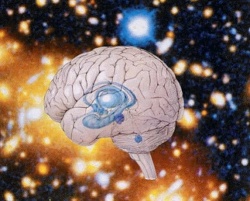Imagination
Imagination, also called the faculty of imagining, is the ability to form new images and sensations that are not perceived through sight, hearing, or other senses. Imagination helps make knowledge applicable in solving problems and is fundamental to integrating experience and the learning process A basic training for imagination is listening to storytelling (narrative), in which the exactness of the chosen words is the fundamental factor to "evoke worlds". It is a whole cycle of image formation or any sensation which may be described as "hidden" as it takes place without anyone else's knowledge. A person may imagine according to his mood, it may be good or bad depending on the situation. Some people imagine in a state of tension or gloominess in order to calm themselves. It is accepted as the innate ability and process of inventing partial or complete personal realms within the mind from elements derived from sense perceptions of the shared world. The term is technically used in psychology for the process of reviving in the mind, percepts of objects formerly given in sense perception. Since this use of the term conflicts with that of ordinary language, some psychologists have preferred to describe this process as "imaging" or "imagery" or to speak of it as "reproductive" as opposed to "productive" or "constructive" imagination. Imagined images are seen with the "mind's eye".
Imagination can also be expressed through stories such as fairy tales or fantasies.
Children often use narratives or pretend play in order to exercise their imagination. When children develop fantasy they play at two levels: first, they use role playing to act out what they have developed with their imagination, and at the second level they play again with their make-believe situation by acting as if what they have developed is an actual reality that already exists in narrative myth.
The common use of the term is for the process of forming new images in the mind that have not been previously experienced with the help of what has been seen, heard, or felt before, or at least only partially or in different combinations. Some typical examples follow:
- Fairy tale
- Fiction
- A form of verisimilitude often invoked in fantasy and science fiction invites readers to pretend such stories are true by referring to objects of the mind such as fictional books or years that do not exist apart from an imaginary world.
Imagination, not being limited to the acquisition of exact knowledge by the requirements of practical necessity is largely free from objective restraints. The ability to imagine one's self in another person's place is very important to social relations and understanding. Albert Einstein said, "Imagination ... is more important than knowledge. Knowledge is limited. Imagination encircles the world."
But in reality, without knowledge, imagination can not be developed.
In various spheres, however, even imagination is in practice limited: thus a person whose imaginations do violence to the elementary laws of thought, or to the necessary principles of practical possibility, or to the reasonable probabilities of a given case is usually regarded by mental health professionals as insane.
The same limitations beset imagination in the field of scientific hypothesis. Progress in scientific research is due largely to provisional explanations which are developed by imagination, but such hypotheses must be framed in relation to previously ascertained facts and in accordance with the principles of the particular science.
Imagination is an experimental partition of the mind used to develop theories and ideas based on functions. Taking objects from real perceptions, the imagination uses complex IF-functions to develop new or revised ideas. This part of the mind is vital to developing better and easier ways to accomplish old and new tasks. These experimental ideas can be safely conducted inside a virtual world and then, if the idea is probable and the function is true, the idea can be actualized in reality. Imagination is the key to new development of the mind and can be shared with others, progressing collectively.
Regarding the volunteer effort, imagination can be classified as:
- voluntary (the dream from the sleep, the daydream)
- involuntary (the reproductive imagination, the creative imagination, the dream of perspective)


